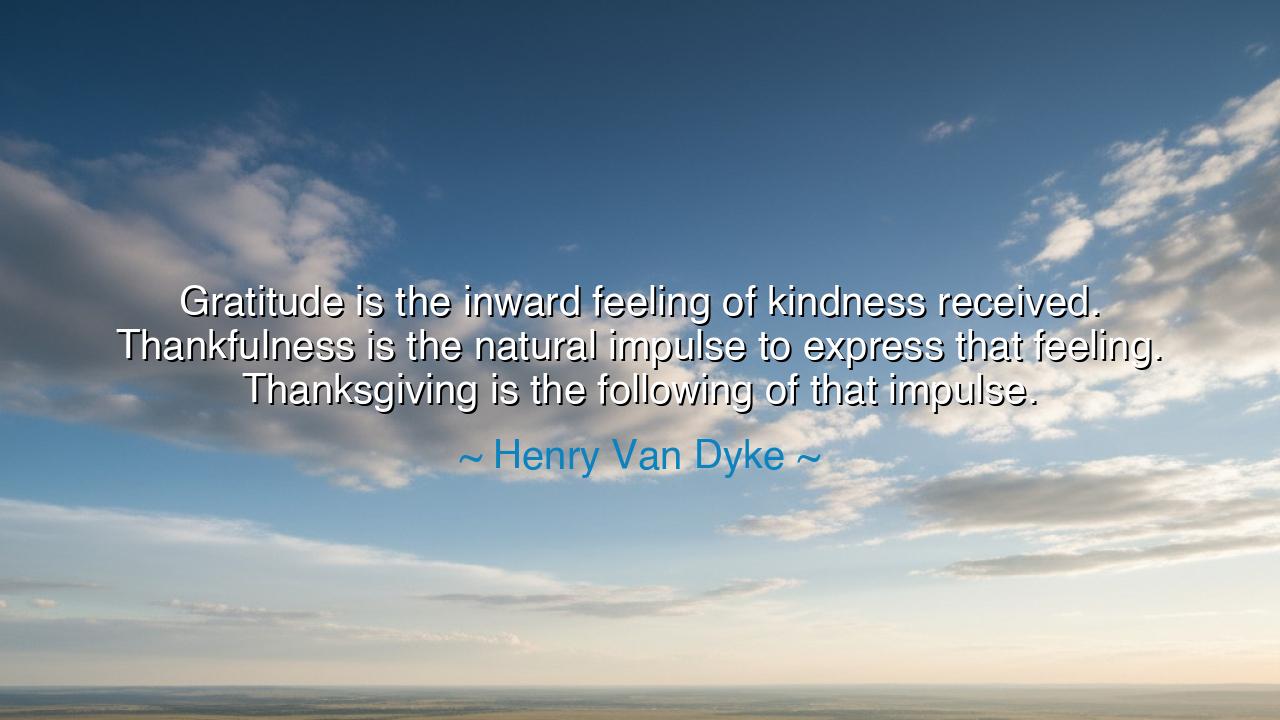
Gratitude is the inward feeling of kindness received.
Gratitude is the inward feeling of kindness received. Thankfulness is the natural impulse to express that feeling. Thanksgiving is the following of that impulse.






"Gratitude is the inward feeling of kindness received. Thankfulness is the natural impulse to express that feeling. Thanksgiving is the following of that impulse." In these layered and luminous words, Henry Van Dyke, poet and minister, unfolds the great journey of the heart from gratitude to thankfulness to thanksgiving. He shows us that these are not the same, but steps in a sacred progression. Gratitude is the seed, thankfulness is the sprout, and thanksgiving is the full flowering of the soul’s response to goodness. To live fully is to walk this path, to let what is inward become outward, and what is outward become action.
The origin of this insight lies in the teachings of both faith and nature. In Scripture, gratitude is often described as the recognition of God’s gifts—"Bless the Lord, O my soul, and forget not all His benefits." Yet gratitude without expression risks becoming silent and stagnant. Van Dyke, shaped by his pastoral calling, understood that thankfulness is the bridge, moving the heart’s inward recognition into words, gestures, and visible expressions. But even words are not enough. The highest form of gratitude, he says, is thanksgiving—the act of doing, of giving, of living out the thankfulness in deeds that honor the kindness received.
History gives us shining examples of this truth. Consider Abraham Lincoln, who in the midst of civil war proclaimed a national day of Thanksgiving in 1863. His gratitude for the nation’s endurance, despite its wounds, moved him to thankfulness in speech, and further still into action: he established a tradition that would call future generations to pause, reflect, and give thanks. His act was more than words; it was thanksgiving embodied, a way of shaping the heart of a people through ritual and remembrance.
Van Dyke’s words also remind us that gratitude is not passive. Gratitude without action is like a flame hidden beneath a bushel, unseen and unfelt. To feel kindness received is the beginning, but it must lead somewhere. The impulse toward thankfulness must be allowed to flow outward, lest it be choked by pride or forgetfulness. True thanksgiving, then, is not simply saying "thank you," but transforming that inner recognition into outward generosity, service, and love.
There is also a profound psychological wisdom here. When we receive kindness and keep it locked within, it may warm us for a time, but when we express it in thankfulness, it multiplies. And when we act upon it in thanksgiving, it blesses others in turn. This cycle creates a river of goodness that flows outward, connecting one act of kindness to another, binding families, communities, and even nations together. Gratitude becomes not a fleeting feeling, but a force that shapes the world.
The lesson for future generations is this: do not stop at gratitude, nor even at thankfulness, but move all the way to thanksgiving. When someone shows you kindness, let your life reflect it. If you have received mercy, be merciful. If you have received love, give love. If you have been lifted, lift another. Gratitude is the inward flame; thanksgiving is the fire upon the altar that warms all who gather near.
Practical action follows from this wisdom: at the end of each day, pause to name what you are grateful for. Then, speak it aloud to someone—a word of thanks, a note, a blessing. Finally, take one step further: act. Give time, share resources, serve where you can. Let gratitude pass from your heart to your hands, from your words to your deeds. For in this, you walk the full path Van Dyke describes: gratitude received, thankfulness expressed, thanksgiving lived.
Thus, his words endure as a map for the soul. Gratitude begins the journey, thankfulness carries it forward, and thanksgiving fulfills it. To live in this rhythm is to live fully awake to kindness, fully engaged in goodness, and fully aligned with the eternal law that kindness received must become kindness given. This is the true spirit of Thanksgiving, not bound to a single day, but woven into the fabric of every breath, every word, every act of a life well-lived.






AAdministratorAdministrator
Welcome, honored guests. Please leave a comment, we will respond soon